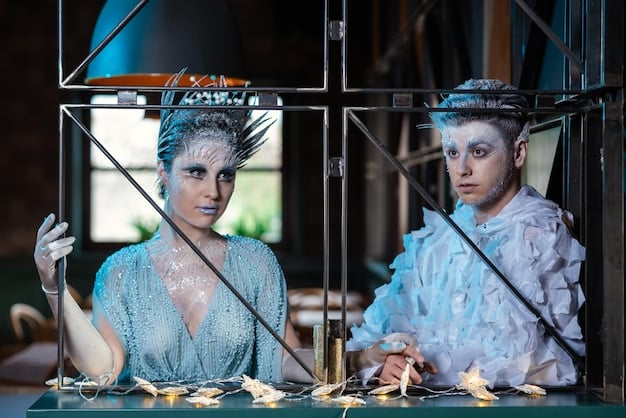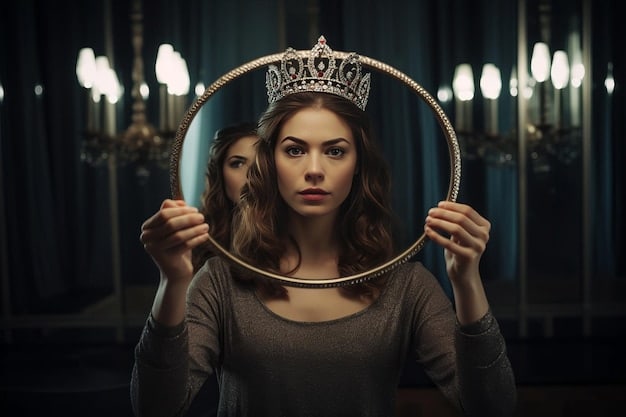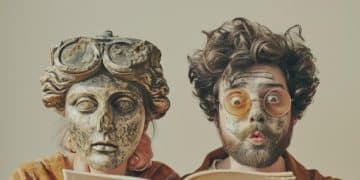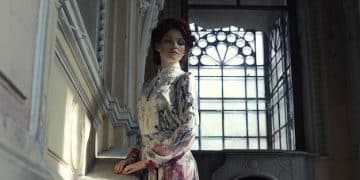Historical Accuracy in Period Piece Dramas: Fact vs. Fiction

Is Your Favorite Period Piece Drama Historically Accurate? Many beloved period dramas take liberties with historical facts for the sake of storytelling, often leading to misconceptions about the past; we delve into some historical inaccuracies in popular recent shows.
Do you ever wonder just how much of that lavish period drama you’re binge-watching is actually true? While these shows transport us to bygone eras with stunning costumes and captivating storylines, they often bend historical facts to enhance the narrative. Let’s explore is your favorite period piece drama historically accurate? by dissecting myths in 3 recent shows.
The Allure of Period Dramas: Entertainment vs. Education
Period dramas have a unique appeal, blending history with compelling storytelling. However, this blend often prioritizes entertainment over strict historical accuracy, leading to some common misconceptions. Understanding this balance is key to enjoying these shows while maintaining a realistic perspective on the past.
The Importance of Historical Context
Historical dramas offer a glimpse into the past, but it’s crucial to remember that they are interpretations, not exact replicas. Filmmakers often take creative liberties to make the story more engaging for a modern audience. This includes altering timelines, simplifying complex political situations, and exaggerating character traits.
Common Historical Inaccuracies
Many period dramas portray events and customs in ways that are not entirely accurate. For example, the fashion, social interactions, and even the hygiene practices of characters might be romanticized or exaggerated. Recognizing these inaccuracies helps viewers appreciate the entertainment value without taking everything as historical truth.
- Costume Design: Often more glamorous than realistic for the period.
- Social Norms: Simplified or modernized to resonate with contemporary audiences.
- Political Events: Condensed or dramatized for narrative impact.
Ultimately, period dramas can be a gateway to learning more about history, but it’s essential to supplement them with factual resources. These shows should be viewed as entertainment, sparking curiosity rather than providing definitive historical accounts.
“Bridgerton”: Debunking Regency Romance
“Bridgerton” captivated audiences with its lavish costumes and scandalous storylines. However, the Netflix hit takes significant liberties with Regency-era history, creating a romanticized version of the past. While entertaining, viewers should be aware of the historical inaccuracies that permeate the show.
Diversity in High Society
One of the most notable aspects of “Bridgerton” is its diverse cast in prominent social positions. While there were certainly people of color in England during the Regency period, their representation in high society was far less prevalent than depicted in the show. This creative choice aims to reflect modern values of inclusivity, rather than historical reality.
Costume and Fashion
The costumes in “Bridgerton” are visually stunning but often deviate from accurate Regency-era fashion. The vibrant colors, modern silhouettes, and revealing necklines are more aligned with contemporary fashion trends. Historical sources suggest that Regency-era clothing was more understated and conservative.
- Bright Colors: Regency-era clothing favored pastel shades over bold colors.
- Revealing Necklines: Dresses typically had higher necklines than those seen in “Bridgerton.”
- Modern Silhouettes: The show incorporates modern fashion elements for visual appeal.
Despite these inaccuracies, “Bridgerton” successfully draws viewers into its world of romance and intrigue. However, it’s important to remember that the show presents a reimagined, rather than a historically accurate, depiction of the Regency era.
“The Great”: A Satirical Take on Catherine’s Rise
“The Great” presents a highly fictionalized account of Catherine the Great’s rise to power in Russia. The show embraces satire and comedic exaggeration, openly acknowledging its departure from historical accuracy. While inspired by real events, “The Great” is more of a parody than a faithful historical retelling.
Character Portrayals
The characters in “The Great” are exaggerated versions of their historical counterparts. Catherine is portrayed as a naive idealist, while Peter is depicted as a buffoonish and cruel ruler. These characterizations are far from the complex and nuanced figures that existed in reality.
Plot and Timelines
The show condenses and alters historical events for comedic effect. The timeline of Catherine’s reign is drastically changed, and many key events are either omitted or reimagined. This approach prioritizes entertainment over historical fidelity, creating a narrative that is both amusing and outlandish.
- Compressed Timeline: Events that occurred over years are condensed into months.
- Exaggerated Conflicts: Political and personal conflicts are amplified for dramatic effect.
- Fictional Characters: Numerous characters are entirely fictional, adding to the show’s satirical nature.
“The Great” is a testament to the power of satire in historical dramas. While it may not be accurate, the show offers a thought-provoking and entertaining commentary on power, politics, and historical myth-making.
“The Crown”: Royal Life Under Scrutiny

“The Crown” aims to provide a more realistic portrayal of the British royal family, but even this acclaimed series takes some liberties with historical accuracy. While the show is based on extensive research and interviews, certain events and conversations are inevitably fictionalized for dramatic purposes. Navigating the line between fact and fiction in royal dramas needs a proper evaluation to keep up with what one needs to understand.
Conversations and Private Moments
One of the main areas of speculation in “The Crown” is the portrayal of private conversations and intimate moments within the royal family. As these events are not publicly documented, writers must imagine what might have been said and done behind closed doors. This creative license allows for dramatic storytelling but also introduces potential inaccuracies.
Character Interpretations
The show’s portrayal of historical figures, such as Prince Philip and Princess Margaret, has sparked considerable debate. While the actors deliver compelling performances, their interpretations of these individuals may not align perfectly with historical accounts. Personal biases and dramatic considerations can influence how these characters are depicted.
- Exaggerated Tensions: Family tensions and personal struggles are often magnified for dramatic impact.
- Sympathetic Portrayals: Characters are sometimes portrayed more sympathetically than historical evidence suggests.
- Artistic License: Dialogue and interactions are crafted to enhance the narrative, rather than strictly replicate historical events.
Despite these limitations, “The Crown” remains one of the most critically acclaimed historical dramas of recent years. The show’s attention to detail and insightful characterizations offer a compelling glimpse into the lives of the British royal family, even if some aspects are embellished for dramatic effect.
The Impact of Dramatization on Historical Perception
Period dramas, while entertaining, significantly influence public perception of history. These shows often shape viewers’ understanding of past events, customs, and figures. The degree to which these portrayals align with historical accuracy varies widely, leading to both positive and negative consequences.
Reinforcing Stereotypes
One potential negative impact is the reinforcement of historical stereotypes. When dramas consistently portray certain groups or time periods in a particular way, it can perpetuate inaccurate or biased perceptions. This is especially problematic when the portrayals are based on limited or outdated historical information.
Sparking Interest in History
On the positive side, period dramas can spark a greater interest in history. By bringing the past to life in an engaging and accessible way, these shows can inspire viewers to learn more about specific events, figures, or time periods. This increased awareness can lead to a more informed and nuanced understanding of history.
- Increased Engagement: Dramas make history more accessible and relatable.
- Educational Opportunities: Viewers may be motivated to research historical topics further.
- Cultural Awareness: Exposure to different historical settings and cultures can broaden perspectives.
Ultimately, the impact of dramatization on historical perception is complex and multifaceted. While period dramas should not be taken as definitive historical accounts, they can serve as valuable tools for education and engagement. The key is to approach these shows with a critical eye, recognizing the blend of fact and fiction that characterizes their narratives.
Distinguishing Fact from Fiction in Period Dramas
Enjoying period dramas responsibly requires a critical approach. Viewers should actively seek out additional information to distinguish fact from fiction. Cross-referencing details with historical sources and expert opinions can provide a more accurate understanding of the events and figures portrayed on screen.
Consulting Historical Sources
One of the best ways to separate fact from fiction is to consult reputable historical sources. Books, documentaries, and academic articles can provide detailed information about the time period, events, and people depicted in the drama. These sources offer a valuable counterpoint to the dramatized version presented in the show.
Seeking Expert Opinions
Historians and other experts can provide valuable insights into the accuracy of period dramas. Many historians offer commentary on popular shows, pointing out inaccuracies and offering alternative interpretations. Seeking out these expert opinions can help viewers develop a more nuanced understanding of the historical context.
- Read History Books: Supplement your viewing with factual accounts.
- Watch Documentaries: Gain a deeper understanding of historical events.
- Follow Historians: Stay informed about historical research and analysis.
By taking a proactive approach to historical accuracy, viewers can enjoy period dramas while maintaining a realistic perspective on the past. These shows can be a gateway to learning, but they should always be supplemented with reliable sources of information.
| Key Point | Brief Description |
|---|---|
| 🎭 Dramatization | Period dramas often prioritize entertainment over exact historical events. |
| 👗 Costume Accuracy | Costumes are frequently stylized and may not reflect historical clothing. |
| 👑 Royal Focus | Shows like “The Crown” take liberty with royal conversations and scenes. |
| 📚 Fact-Checking | Supplement dramas with research for a balanced view on the portrayed history. |
Frequently Asked Questions
▼
Period dramas offer an escape to different eras, blending history with compelling storytelling. The detailed costumes, sets, and social dynamics provide a rich visual and narrative experience that appeals to a broad audience, sparking curiosity about the past.
▼
Historical accuracy varies depending on the show. Some dramas prioritize realism, while others take creative liberties for entertainment. It’s essential to approach these shows with a critical eye, recognizing that they are interpretations of history.
▼
Common inaccuracies include stylized costumes that don’t match the era’s fashion, simplified social norms that reflect modern sensibilities, and condensed or dramatized historical events. Private conversations and intimate moments are often fictionalized as well.
▼
Cross-reference the drama’s details with historical sources such as books, documentaries, and academic articles. Consult historians and experts for their insights and critiques. This will provide a balanced view of the events and figures portrayed.
▼
Yes, period dramas can spark interest in history and inspire viewers to learn more about specific events, figures, or time periods. Dramas make history more accessible and relatable, broadening cultural awareness if supplemented with fact-checking.
Conclusion
While indulging in period dramas, maintaining a balance between enjoyment and historical awareness is key. Recognizing that these shows often blend fact with fiction allows viewers to appreciate the entertainment value without accepting everything as historical truth. By seeking additional information from reliable sources, enthusiasts can deepen their engagement with history and gain a more nuanced understanding of the past.





